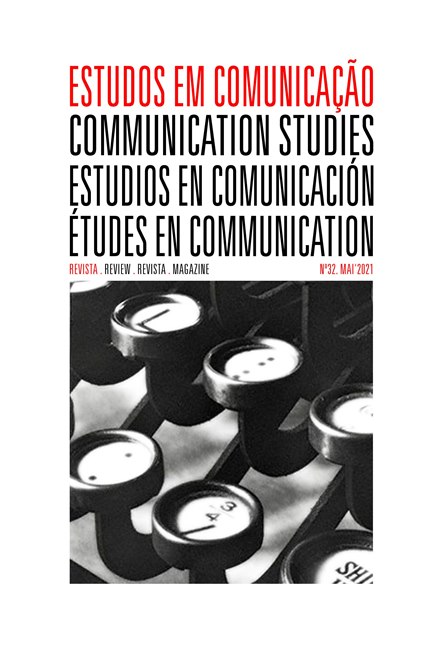Covid-19: Fact-checking to contain disinformation about chlorochine and hydroxychlorocchine
Keywords:
fack-checking, fake news, misinformation, post-truth, Covid-19Abstract
The Covid-19 virus pandemic shook the world in 2020. This article aims to analyze how the combination of disinformation, associated with diverse factors, such as controversial interests between science, economics and politics, in addition to cyclical issues, such as the crisis of confidence in Journalism and the precariousness of professional activity, can further strain the confrontation of a serious public health problem. To carry out our research, we used a analysis on information that was checked by two fact-checking agencies in South America: Comprova, from Brazil, and ColombiaCheck, from Colombia, on the recommendation and the use of two drugs in the fight against coronavirus: chloroquine and hydroxychloroquine. In total, 12 articles were analyzed, from March to June, in addition to having made articulations based on bibliographic review on the themes: propagation of fake news, post-truth, fact-checking. It is clear that the practice of checking by agencies has become relevant in combating the phenomenon of the spread of disinformation, but it is still a long way from containing this scenario.
References
(2018). Journalism, ‘Fake News’ & Disinformation. UNESCO. https://en.unesco.org/node/295873.
(2020, janeiro 22). Colômbia anuncia suspeita de primeiro caso de Coronavírus no país. UOL. https://noticias.uol.com.br/internacional/ultimas-noticias/2020/01/2
/colombia-anuncia-suspeita-de-primeiro-caso-de-coronavirus-no-pais.htm.
(2020, fevereiro 29). As 15 fake news mais compartilhadas sobre coronavírus. O Globo. https://oglobo.globo.com/sociedade/as-15-fake-news-mais-compartilhadas-sobre-coronavirus-1-24278939.
(2020, abril 15). Pesquisa revela dados sobre ’fake news’ relacionadas à Covid-19. Fiocruz. https://portal.fiocruz.br/noticia/pesquisa-revela-dados-sobre-fakenews-relacionadas-covid-19.
(2020, junho 9). Atila Iamarino: Para reabrir é preciso transparência nos dados da covid-19. Exame. https://exame.com/ciencia/atila-iamarino-para-reabrir-epreciso-transparencia-nos-dados-da-covid-19/.
(2020, junho 17). Coronavírus: as razões da OMS para suspender novamente testes com hidroxicloroquina. UOL. https://noticias.uol.com.br/ultimas-noticias/bbc/2020/06/17/coronavirus-oms-volta-a-suspender-testes-com-hidroxicloroquina.htm.
(2020, junho 19). Coronavirus disease (Covid-19): Hydroxychloroquine. World Health Organization. www.who.int/news-room/q-a-detail/q-a-hydroxychloroquine-and-covid-19.
Andrade, F. (2020, maio 15). Teich deixa o Ministério da Saúde antes de completar um mês no cargo e após divergir de Bolsonaro. G1. https://g1.globo.com/politica/noticia/2020/05/15/teich-deixa-o-ministerio-da-saude-antes-de-completar-um-mes-no-cargo.ghtml.
Camporez, P. (2020, julho 11). Quem são os empresários que ganham com a cloroquina no Brasil. UOL. https://noticias.uol.com.br/ultimas-noticias/agenciaestado/
/07/11/quem-sao-os-empresarios-que-ganham-com-a-cloroquina-no-brasil.htm?utm_source=facebook&utm_medium=social-media&utm_campaign=noticias&utm_content=geral.
Castells, M. (2000). Sociedade em Rede (8ª ed.). Paz e Terra.
Castilho, C. (2016, setembro 28). Apertem os cintos: estamos entrando na era da pós-verdade. Observatório da Imprensa. https://goo.gl/8sZdzP.
D’Ancona, M. (2018). Pós-verdade: a nova guerra contra os fatos em tempos de fake News (1ª ed.). Faro Editorial.
Dantas da Silva, M. et. al. (2019). Representação da informação noticiosa pelas agências de fact-checking: do acesso à informação ao excesso de informação. RBBD. Revista Brasileira de Biblioteconomia e Documentação, 15(2), 410-426. https://rbbd.febab.org.br/rbbd/article/view/1225/1142.
Flamini, D. (2019, junho 12). The new fact-checkers on the block at Global Fact 6. Poynter. www.poynter.org/fact-checking/2019/the-new-fact-checkers-on-the-block-at-global-fact-6/.
Manjoo, F. (2008). True Enough: Learning to live in a post-fat society. John Wiley & Sons.
Newman, N., Fletcher, R., Schulz, A., Andi, S., & Nielsen, R. (2020). Digital News Report 2020. Reuters. www.digitalnewsreport.org/.
Palacios, M. (2018.) Fake News e a emergência das Agências de Checagem: Terceirização da Credibilidade Jornalística?. In M. Martins & I. Macedo (Eds.), Políticas da Língua, da Comunicação e da Cultura no Espaço Lusófono (pp. 77-90). Universidade do Minho.
Pérez, C. (2019). No diga fake news, di desinformación: una revisión sobre el fenómeno de las noticias falsas y sus implicaciones. Dialnet, (40), 65-74.
Ramonet, I. (2012). A explosão do jornalismo: das mídias de massa à massa de mídia. Publisher Brasil.
Ramonet, I., Moraes, D., & Serrano, P. (2013). Mídia, poder e contrapoder: da concentração monopólica à democratização da informação. Boitempo.
(s.d.). Colombiacheck. https://colombiacheck.com/.
(s.d.). Folha informativa – COVID-19. OPAS. www.paho.org/bra/index.php?option=com_content&view=article&id=6101:covid19&Itemid=875.
Silverstone, R. (2002). Por que estudar a mídia?. Edições Loyola.
Shalders, A. (2020, abril 16). Mandetta é demitido do Ministério da Saúde após um mês de conflito com Bolsonaro: relembre os principais choques. BBC. www.bbc.com/portuguese/internacional-52316728.
Spinelli, E., & Santos, J. (2018). Jornalismo na era da pós-verdade: fact-checking como ferramenta de combate às fake news. Revista Observatório, 4(3), 759-782. https://sistemas.uft.edu.br/periodicos/index.php/observatorio/article/view/4629.
Tardáguila, C., Stencel, M., & Luther, J. (2019, outubro 21). There are 210 activefact-checkers in 68 countries, says the Duke Reporters’ Lab. Poynter. www.poyn ter.org/fact-checking/2019/there-are-210-active-fact-checkers-in-68-countries
-says-the-duke-eporters-lab/.
Downloads
Published
Issue
Section
License
Estudos em Comunicação/Communication Studies is an Open Access journal. All its content is freely available without charge to the user or his institution. Users are allowed to read, download, copy, distribute, print, search, or link to the full texts of the articles in this journal without asking prior permission from the publisher or the author. Estudos em Comunicação, by Labcom, is licensed under a Creative Commons Atribuição-NãoComercial-SemDerivações 3.0 Unported License. By submitting your work to Estudos em Comunicação/Communication studies you confirm you are the author and own the copyright, that the content is original and previously unpublished, and that you agree to the licensing terms.


